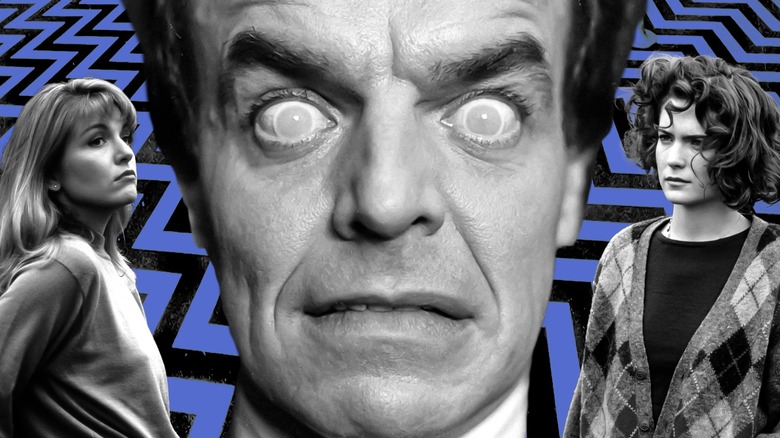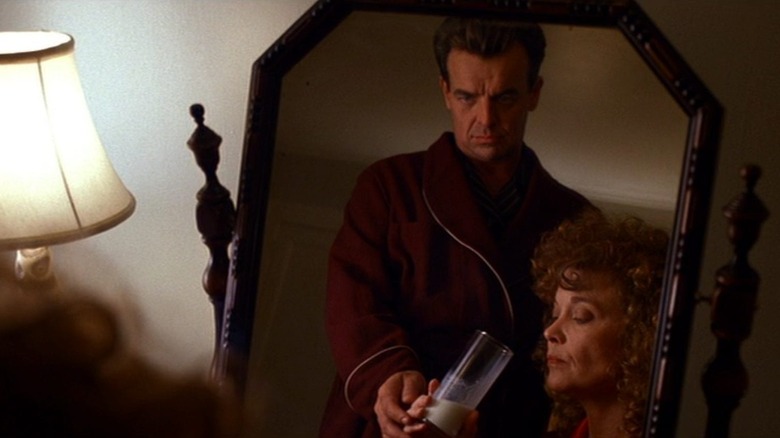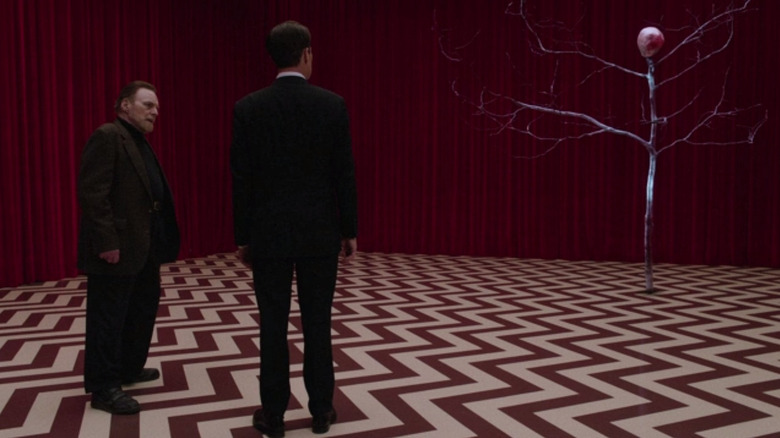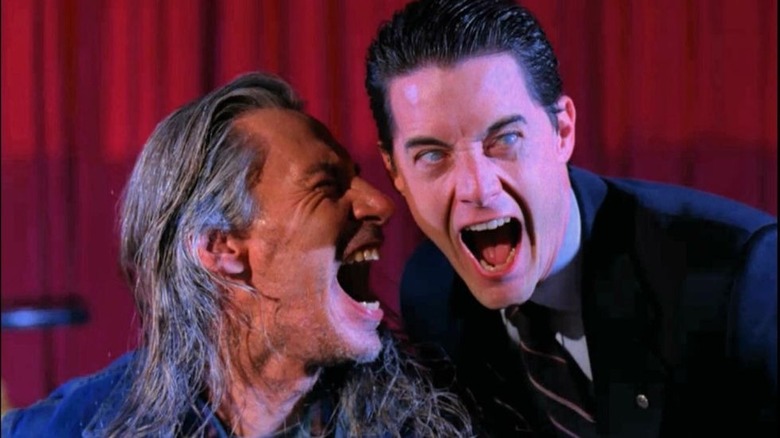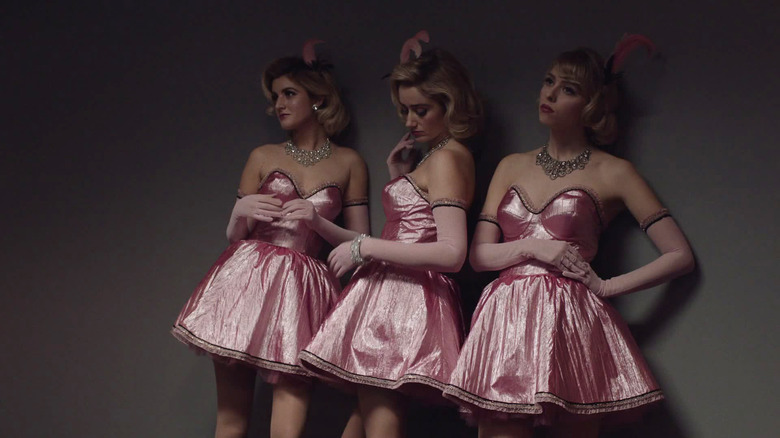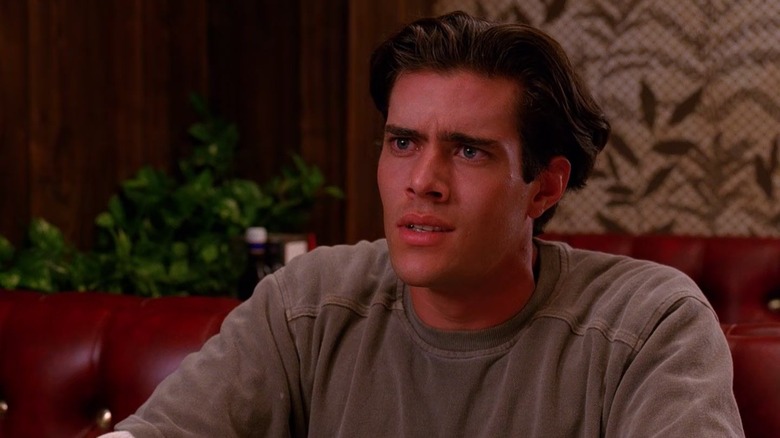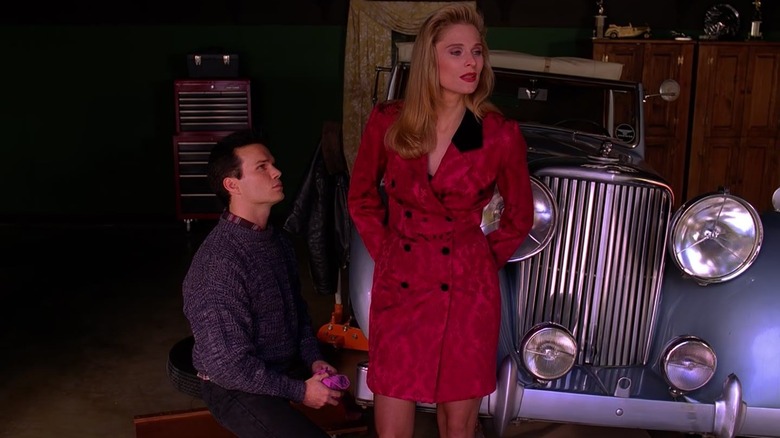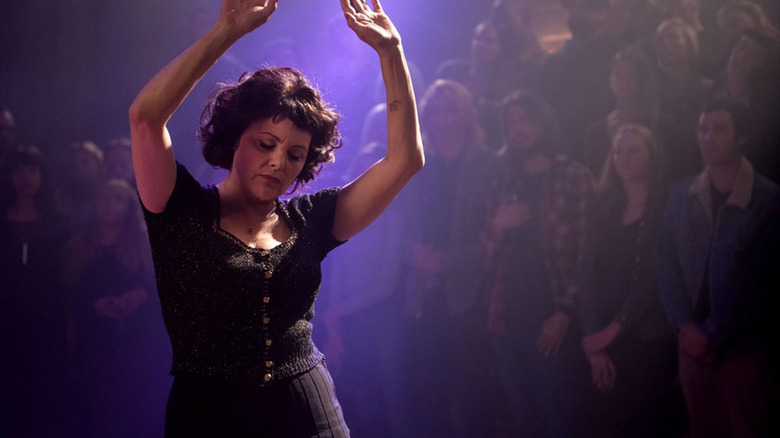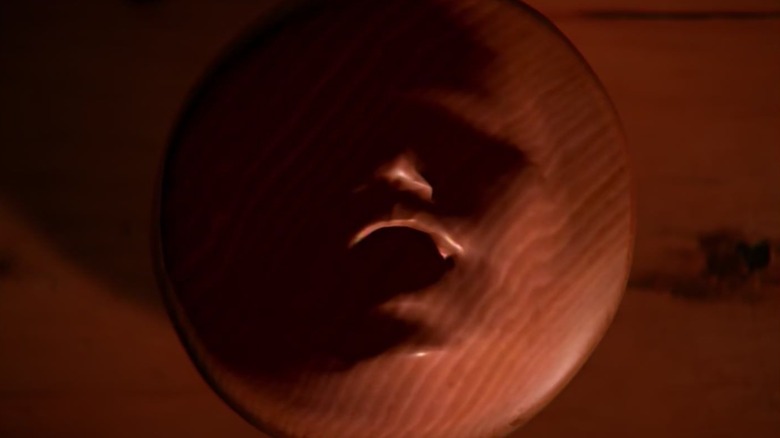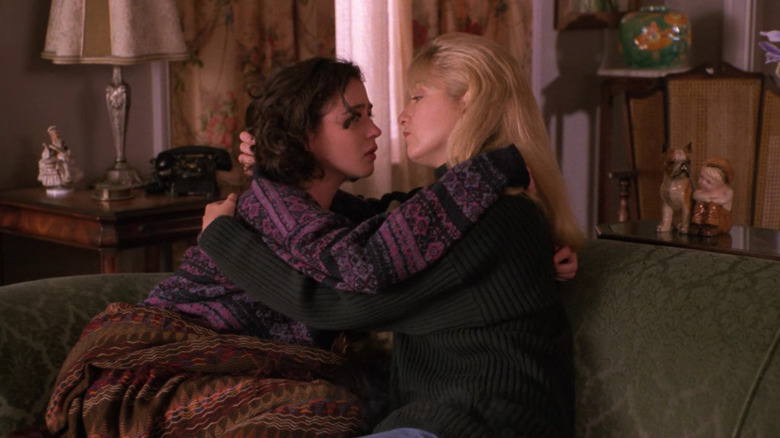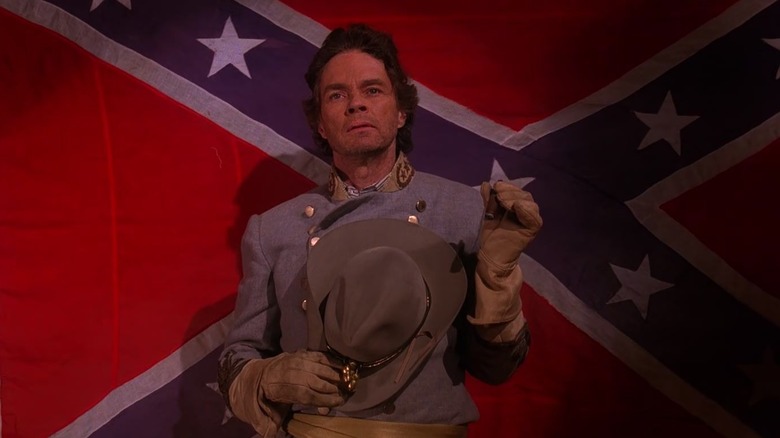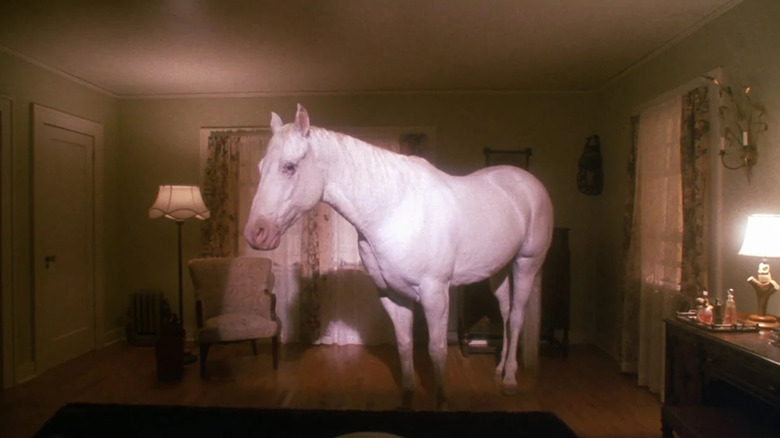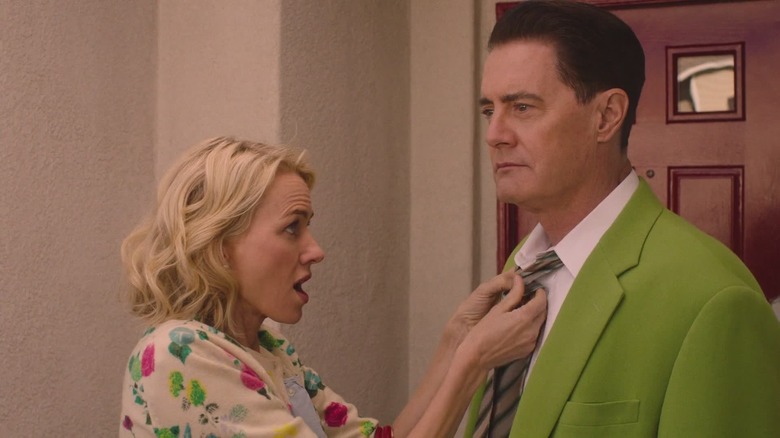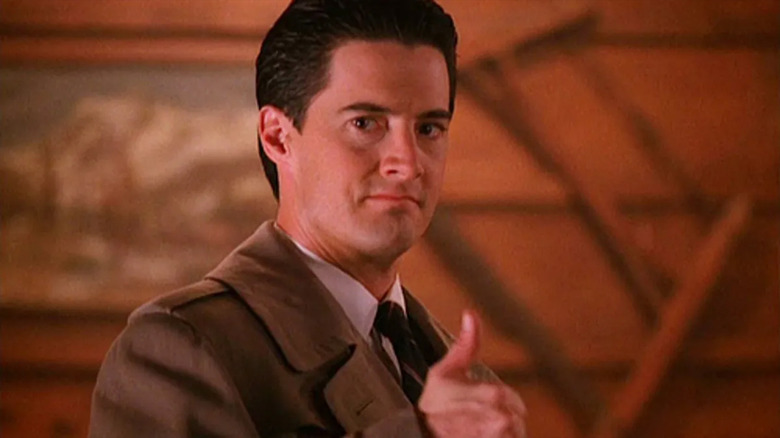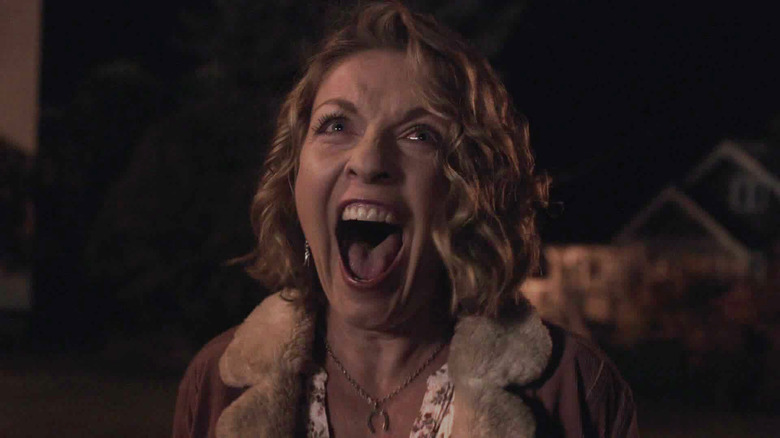The 7 Best And 7 Worst Things About Twin Peaks
There's probably no other show in television history with a greater disparity between its high highs and its low lows that "Twin Peaks." Perhaps best described as a "supernatural mystery soap opera," the series was created in 1990 as a collaboration between surrealist filmmaker David Lynch and veteran television writer Mark Frost. Though an unparalleled hit during its first season, midway through Season 2, pretty much everyone started to sour on the whole endeavor: audiences, critics, and even the people making it. Unsurprisingly, the series was canceled at the end of that season.
In 1992, Lynch tried to revive this budding franchise with the theatrical film "Twin Peaks: Fire Walk With Me." Though generally regarded today as an incomparable masterpiece, upon its initial release, the film got a surprisingly chilly critical reception and killed any possibility of additional "Peaks" for the next couple of decades. However, in 2017, Lynch and Frost reunited once more to create a third season, often called "Twin Peaks: The Return." This newest (and probably final) chapter is more "Twin Peaks" than ever, a strange and challenging tour de force.
The entire "Twin Peaks" saga is generally thought of as a masterpiece, and rightfully so, though at times it's a difficult show to love. However, even when it's at its most incomprehensible and frustrating, it's always worth watching and it's always worth discussing, so that's what we're doing today, outlining everything good and everything bad about this highly polarizing piece of television history. Not just the peaks, but also the valleys.
Best: The transcendent acting
Whether they're Hollywood heavyweights or those for whom this is their only real credit, pretty much every actor on "Twin Peaks" is delivering one of the best performances of their careers, or at least one of their most memorable. Kyle MacLachlan gives the performance of a lifetime as Special Agent Dale Cooper. Despite the show's unceasing strangeness, he is the human heart that grounds us and guides us through it all. Additionally worth highlighting are the members of the Palmer family: Sheryl Lee as Laura, Ray Wise as Leland, and Grace Zabriskie as Sarah. Especially in "Fire Walk With Me," these three deliver an unforgettable trio of heartbreaking and often deliberately exaggerated performances.
Almost every actor is given a role they were born to play. Whether it's Kimmy Robertson as Lucy, Dana Ashbrook as Bobby, or Michael Horse as Deputy Hawk, it's not just that you can't imagine another actor playing that role. Once you've seen "Twin Peaks," you almost can't imagine that actor as anyone else. Even the more bizarre characters, like the Log Lady, are perfectly performed to suit the show's tone.
By the time of "The Return," even current-day celebs who are sometimes dismissed as mere comedy B-listers, like Matthew Lillard and Michael Cera, show up and deliver jaw-dropping guest performances unlike anything else they've ever done. There's just something about "Twin Peaks" that brings out a different side of people.
Worst: For some people, it's just too weird
As great as "Twin Peaks" can be, it's also undeniably strange. There's an awkward, off-kilter energy to most scenes; the dialogue is sometimes a bit stilted or bizarre; and some episodes eschew conventional plot structures altogether, opting instead for dreamlike logic and a lackadaisical pace. At some points while watching, you'll probably ask yourself, "Do I even like this? Is this being weird in a good way, or is it just being weird?" Only you can answer that question.
After a hard day, many people want to watch something comfortable. They might choose a lighthearted sitcom or a pleasantly formulaic procedural, and there's nothing wrong with that. There's tremendous value in predictable episode structures and a stable status quo. That is not "Twin Peaks." It must be watched actively, even when it seems like nothing is going on. Even for those who are willing to put in that work, many will still never be able to connect to it, and that's OK. Some people will never like death metal, others will never enjoy pineapple on their pizza, and a small few will never love "Twin Peaks."
Best: The uncompromising horror
"Twin Peaks" is, among other things, an exploration of evil. The show posits that horror can be lurking anywhere, even in a seemingly idyllic small town. When you start watching the series, you may be prepared for this idea, in theory. But then, as Laura Palmer's secrets are slowly uncovered, you realize that these are not the cool or sexy secrets you were hoping for. The things that were being done to Laura before her death were the worst things imaginable, and the only thing worse was the person who was doing them.
When supernatural horrors appear, along similar lines, they are not cool or sexy. These are incarnations of pure cruelty that will make you suffer in ways you can't imagine. They will steal your body and subject your friends and loved ones to unspeakable acts while wearing your face, and when they do it, they will be laughing.
This show is as dark as dark gets, but it's also almost always earned, an essential part of the story being told. After all, this is a story about uncovering the uncomfortable truths that no one is willing to talk about, and in a time when American popular culture was obsessed with "stranger danger," the real truth is that horror can be lurking anywhere, even within a seemingly loving family.
If you or anyone you know has been a victim of sexual assault, visit the Rape, Abuse & Incest National Network website or contact RAINN's National Helpline at 1-800-656-HOPE (4673).
Worst: The pacing
An awful lot goes on in "Twin Peaks," with dozens of recurring characters tangled up in a complex web of secrets and desires. Unfortunately, the benefits of working at such a scale also come with a pretty substantial drawback: at times, the pacing seems glacial.
Because the show splits its time across many disparate plotlines, chances are good that you'll find some you absolutely love, while others make you want to tear your hair out. You might be super invested in the murder mystery, but not care one bit about Benjamin Horne. You may love the tension between Ed and Norma, but roll your eyes at James, Donna, and Maddy. Did you just see an amazing scene with your favorite character? They probably won't appear again in this episode, and they might not be in the next episode at all.
The way the show decides to spend its runtime is frequently rather baffling, often prioritizing dead-end storylines for far too long while seemingly ignoring the more compelling characters and important aspects of the setting. For all the ways the third season improves upon the shortcomings of the original two, this particular issue becomes more pronounced than ever. "The Return" can be so slowly paced at times it honestly feels like self-parody, as if deliberately trolling those who'd like to see their favorite old characters again, or who'd like some sort of plot to eventually occur.
Best: The raw humanity
The term "Lynchian" is often synonymous with the inexplicable and alien. The popular conception of "Twin Peaks" is that it's completely divorced from any recognizable reality, full of log-loving ladies and backward-talking weirdos. In truth, the works of David Lynch in general, and "Twin Peaks" in particular, are first and foremost concerned with very real human emotions, often to a greater degree than more conventional works of genre television.
Although the show certainly has its moments of inexplicable strangeness, most episodes follow the mundane dramas of everyday life and ordinary people searching for love in a harsh and indifferent world. The show deeply cares about all these characters, beyond just their function in the plot, as an end in themselves. It's not a story about the unfathomable, but about people who are forced to confront the unfathomable.
In the making-of documentary, "Secrets From Another Place: Creating Twin Peaks," actress Sherilyn Fenn, who played Audrey Horne, offered this take on the strangeness of Lynch: "It's a part of his truth on some very personal level, and it's not, 'let's just shock-value and be weird for being weird.' The show wouldn't have been a success if that's what it was about."
Worst: The second season
Midway through the show's second season, "Twin Peaks" makes perhaps its single biggest misstep when it reveals the answer to the question at the heart of the show: "Who killed Laura Palmer?" To be clear, it's a truly amazing episode, and it was theoretically possible for the show to continue after this point. The supernatural killer was still at large, and plenty of unanswered questions remained. What would happen next?
Well, in the following episode, the show dropped pretty much every plot thread it had been following up until that point and introduced half a dozen brand-new storylines into the mix. None were particularly compelling, and some were downright abysmal. This led to a true slog of a half-season, universally regarded as the worst era of the show by far.
As explained in the making-of documentary "Secrets From Another Place: Creating Twin Peaks," a major contributing factor to this decline is the fact that David Lynch was becoming less involved at this point, devoting more of his attention to developing his film "Wild at Heart." Many of the show's actors have told stories about this period, and they certainly don't sugarcoat their opinions. In the aforementioned documentary, actress Kimmy Robertson was the most succinct and candid of all when she said, "I thought the whole second season pretty much sucked."
Best: The music
In some ways, "Twin Peaks" seems like an odd assemblage of parts that shouldn't fit together. It's a soap opera, police procedural, supernatural thriller, wacky sitcom, and Dadaist art film. Yet it forms a cohesive whole, and one of the biggest reasons why is the music.
All iterations of "Twin Peaks" — the original series, the film, and the revival — feature amazing music by Angelo Badalamenti. It's a score that doesn't quite sound like anything else you've heard. It's moody atmospheric jazz that is somehow both creepy and comforting at the same time, a perfect encapsulation of that unique "Twin Peaks" feeling. The show's opening theme, "Falling," even won the 1991 Grammy Award for Best Pop Instrumental Performance.
"The Return" takes the show's already phenomenal music to a whole new level. In addition to a spooky ambient score, around once per episode the show also features a scene at Twin Peaks' famous roadhouse, in which a real-world artist performs an entire uncut song. Some artists featured include Nine Inch Nails, Eddie Vedder, Julee Cruise, and Rebekah Del Rio. Since "The Return" can be a rather harrowing experience at times, these weekly musical numbers help give audiences a little break, letting them bask in those neon chill dive bar vibes for a few minutes until it's time for the horrors to once again resume.
Worst: The cruelty
"Twin Peaks" often goes to some truly dark places, and we're not just talking about the woods. The show explores murder, PTSD, drug addiction, and even suicide. Although these themes are usually explored respectfully, the show occasionally takes things a bit too far, treating its characters with almost unfathomable cruelty. One such example is the story of Josie Packard.
At first, Packard is presented as a shrewd and glamorous — though ultimately sympathetic — femme fatale. Then, during Season 2, she's subjected to a series of increasing indignities. First, she's forced into working as a maid for her sister-in-law/nemesis, Catherine Martell. Then, her once–presumed dead husband resurfaces, seeking to reclaim his dominance over her. Finally, bizarrely, she is killed by the malevolent denizens of the Red Room for no apparent reason. Strangest of all, Josie's screaming face then appears briefly in the handle of a drawer, perhaps implying that she's been doomed to some sort of eternal torment in this piece of wooden furniture.
Setting aside the question of whether this is good or interesting writing, one wonders what sort of deeper meaning this is supposed to convey. Given how well this show usually handles difficult subject matter, these occasional moments of apparent unrestrained sadism are discordant with the rest of the show. Heck, even when the show "earns it," it still doesn't make it any easier to watch.
If you or anyone you know needs help with addiction issues, visit the Substance Abuse and Mental Health Services Administration website or contact SAMHSA's National Helpline at 1-800-662-HELP (4357).
If you or anyone you know is having suicidal thoughts, please call the National Suicide Prevention Lifeline at 1-800-273-TALK (8255).
Best: The queer text and subtext
"Twin Peaks" has long been a favorite of LGBTQ+ viewers everywhere due to the queer content in the show, some textual and some subtextual. The show features an openly transgender character named Denise Bryson, played by David Duchovny. By the standards of early 1990s television, she's portrayed with a pleasantly surprising degree of respect and humanity.
There are also numerous relationships within the show that are read by many viewers as full of unspoken queer love, such as the highly intimate fast friendship between Dale Cooper and Harry Truman, and the storm of conflicting emotions that rage between Laura Palmer and Donna Hayward. Given that the show is often about love, secrets, and hidden shame, there's much to be gained by reading "Twin Peaks" through a queer lens.
Perhaps the greatest moment of "Peaks" stating clearly and unambiguously its stance on queer issues comes in Season 3, when FBI Deputy Director Gordon Cole — a character played by David Lynch himself — recalls a time when some of his subordinates were less than welcoming to their newly out trans colleague. He explains that he had a message for them, a now iconic turn of phrase that adorns the Twitter bios of many queer "Twin Peaks" fans: "Fix your hearts or die."
Worst: The poorly aged parts
When "Twin Peaks" first premiered in 1990, it was, in many ways, decades ahead of its time. In other ways, however, it was very much of its time. Especially in the first two seasons, there's no shortage of plot elements that are offensive to modern sensibilities.
The show often jokes about the gender and sexuality of its trans character, Denise Bryson, and it's sometimes a bit unclear exactly who is supposed to be the butt of that joke. In the interviews with David Duchovny on the box set, "Twin Peaks: From Z to A," he sometimes implies that the entire idea of his "transvestite" character is nothing but a punchline. Additionally, there's a brief subplot in which Benjamin Horne becomes creepily obsessed with the Confederacy. Again, exactly what the show wants us to feel about this development is unclear.
However, without a doubt, the most offensive thing in "Twin Peaks" is Mr. Tojamura. Midway through Season 2, there's a "new character" in town, a mysterious "Japanese businessman" who is clearly just a white person in yellowface. After multiple episodes of this awful character just hanging around as part of the ensemble, it's eventually revealed that Mr. Tojamura is, in fact, Catherine Martell, a character who died last season, now returned and wearing a disguise. This bizarre and hurtful development is one of many reasons why Season 2 leaves much to be desired.
Best: The unsolvable mysteries
The first time you watch "Twin Peaks," you'll probably spend a fair portion of your time trying to "solve" it — not just Laura Palmer's murder, but everything else, too. What's up with the creamed corn? Or the white horse? What does "Fire Walk With Me" even mean? It's no exaggeration to say that pondering such enigmas can evoke a feeling akin to staring at the starry sky on a clear night. The scale of it is so vast that it demands your undivided attention while simultaneously defying your ability to understand it.
In time, some of your questions will be answered. You'll learn all about blue roses, doppelgangers, and garmonbozia. In the end, though, many of the show's mysteries will remain mysterious. For some, the impulse may be to get angry with the show for stringing you along, when in truth there never was an answer to begin with. There's a wonderful benefit to this sort of storytelling, one that you may miss if you are only focused on finding the "right answer" to the questions it raises.
A mystery with a solution is like a joke with a punchline: it makes you laugh once and then never again. A mystery without a solution, properly constructed, becomes more like poetry, which can be studied and pondered for a lifetime. You may never know what's up with "Judy" or why David Bowie became a tea kettle, but that's okay. Just because you don't understand something doesn't mean you can't be moved by its beauty. After all, you can't "solve" the night sky either.
Worst: Dougie Dale
For the most part, "The Return" is a huge improvement on the first two seasons, but one aspect of this season ends up being one of the most challenging plotlines in "Twin Peaks" history: when Dale becomes "Dougie."
In the Season 2 finale, Dale Cooper's evil doppelganger escapes from the otherworldly Red Room and swaps places with Dale. In "The Return," after 25 years of being imprisoned, Dale returns to the real world, but there's a problem. It appears that Evil Dale created another copy of Cooper as a decoy, a frumpy insurance adjuster named Dougie Jones. Instead of replacing Evil Dale upon returning, our Dale takes the place of Dougie, and he also comes back a little... different.
Upon arrival, Dale has seemingly lost almost all of his memories and cognitive function. The people around him assume he's just their old pal, the goofy and bumbling Dougie, and treat him as such. However, as the episodes continue to roll on by, and Dale is still stuck in "Dougie mode," eventually his comedic catatonia gets tiresome. It isn't until episode 15 that Dale finally regains his full faculties, leaving just three episodes remaining for our hero, Dale Cooper, to actually be himself.
In the end, we must reluctantly admit that we love "Dougie Dale," but he sure doesn't make it easy.
Best: Its staying power
One of the most unique things about "Twin Peaks" is not just the experience of watching the show, but what the experience of having watched the show does to your brain. You may find that once ordinary phrases such as "Let's rock" or "It is happening again" are now charged with a bit of extra strangeness. Nonsensical sentences may get stuck in your brain, like "That gum you like is going to come back into style" or "The owls are not what they seem." Eventually, these odd phrases become pleasing mantras that aimlessly swim around your mind, much like "a fish in the percolator." You'll certainly never think about cherry pie and ceiling fans the same way again.
Your feelings about art and storytelling may change as well. You may find yourself bored by conventional genre TV, and far more tolerant of slow pacing and unconventional acting. You may even learn to love imperfect art without making excuses for it — not laughing at cult classics in a "so bad it's good" kind of way, but genuinely getting invested in certain aspects of them. Fair warning: normal TV shows and movies might not cut it for you once you've tasted the hard stuff.
Worst: There's just not enough of it
While many problems plague "Twin Peaks," most wouldn't sting so badly if there were more of it. Long-running series can have plenty of rocky episodes, and it's not a big deal in the grand scheme of things. The part that hurts most is wondering what would've happened had "Twin Peaks" gotten another season or two during its initial run to truly find itself.
In that way, the story of the television series ends up mirroring the story of Laura Palmer herself. She was a beautiful young soul. Sure, she made some mistakes, but someday she probably would have figured things out. The tragedy is not only that she's gone but also that she never got the chance to grow up, and now never will.
It's certainly a reading that jibes with the apparent philosophy of Season 3. Rather than "fixing" the flaws of the original series, "The Return" doubles down on many of them, purposefully frustrating us by omitting our favorite characters and denying us closure. After all, Dale's final attempt to travel back in time and save Laura only ends in tragedy. Perhaps the loss of "Twin Peaks" itself doesn't need to be fixed. Everything ends. "Twin Peaks" is over, and you need to accept that.
After all, Lynch and Frost were given total creative freedom to make this final season whatever they wanted, and they choose to end it with their biggest cliffhanger yet: one last twist of the knife to leave fans confused and unsatisfied forever. In a way, you can't help but admire their commitment to ensuring "Twin Peaks" stays "Twin Peaks."
